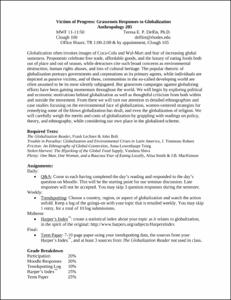Please use this identifier to cite or link to this item:
http://hdl.handle.net/10267/1430Full metadata record
| DC Field | Value | Language |
|---|---|---|
| dc.contributor.author | Delfin, Teresa E. P. | - |
| dc.date.accessioned | 2008-03-31T16:42:45Z | - |
| dc.date.available | 2008-03-31T16:42:45Z | - |
| dc.date.issued | 2008-03-31T16:42:45Z | - |
| dc.identifier.uri | http://hdl.handle.net/10267/1430 | - |
| dc.description | This syllabus was submitted to the Rhodes College Office of Academic Affairs by the course instructor | en_US |
| dc.description.abstract | Globalization often invokes images of Coca-Cola and Wal-Mart and fear of increasing global sameness. Proponents celebrate free trade, affordable goods, and the luxury of eating foods both out of place and out of season, while detractors cite such broad concerns as environmental destruction, human rights abuses, and loss of cultural heritage. The popular rhetoric of globalization portrays governments and corporations as its primary agents, while individuals are depicted as passive victims, and of these, communities in the so-called developing world are often assumed to be its most silently subjugated. But grassroots campaigns against globalizing efforts have been gaining momentum throughout the world. We will begin by exploring political and economic motivations behind globalization as well as thoughtful criticism from both within and outside the movement. From there we will turn our attention to detailed ethnographies and case studies focusing on the environmental face of globalization, women-centered strategies for remedying some of the blows globalization has dealt, and even the globalization of religion. We will carefully weigh the merits and costs of globalization by grappling with readings on policy, theory, and ethnography, while considering our own place in the globalized scheme. | en_US |
| dc.language.iso | en_US | en_US |
| dc.publisher | Memphis, Tenn. : Rhodes College | - |
| dc.relation.ispartofseries | Syllabi CRN | en_US |
| dc.relation.ispartofseries | 28248 | en_US |
| dc.rights | Rhodes College owns the rights to the archival digital images in this repository. Images are made available for educational use only and may not be used for any non-educational or commercial purpose. Approved educational uses include private research and scholarship, teaching, and student projects. For additional information please contact archives@rhodes.edu. Fees may apply. | - |
| dc.subject | Anthropology and Sociology, Department of | en_US |
| dc.subject | Syllabus | en_US |
| dc.subject | Curriculum | en_US |
| dc.subject | Academic departments | en_US |
| dc.subject | Text | en_US |
| dc.subject | 2008 Spring | en_US |
| dc.title | ANSO 205-01, Grassroots Responses to Globalization, Spring 2008 | en_US |
| dc.type | Syllabus | en_US |
| Appears in Collections: | Course Syllabi | |
Files in This Item:
| File | Description | Size | Format | |
|---|---|---|---|---|
| 2008_sp_ANSO_205-01_28248.pdf | 58.51 kB | Adobe PDF |  View/Open |
Items in DSpace are protected by copyright, with all rights reserved, unless otherwise indicated.